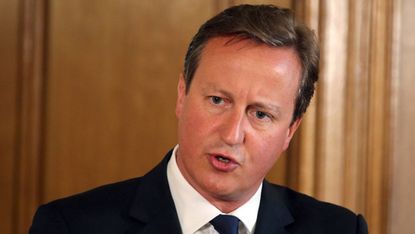Tories reveal plans to break ties with human rights court
Conservatives to scrap Human Rights Act and seize power from Europe if they win the next election

David Cameron is planning to cut ties with the European Court of Human Rights unless it allows British parliament to have the final say over its rulings.
The prime minister is due to announce plans to scrap the 1998 Human Rights Act and break the formal link between UK courts and the human rights court in Strasbourg if his party wins the next general election.
A new British Bill of Rights would prevent human rights laws being used by terrorists and criminals to stay in the UK, by travellers to occupy land illegally and by prisoners to demand the vote, say the Conservatives.
Subscribe to The Week
Escape your echo chamber. Get the facts behind the news, plus analysis from multiple perspectives.

Sign up for The Week's Free Newsletters
From our morning news briefing to a weekly Good News Newsletter, get the best of The Week delivered directly to your inbox.
From our morning news briefing to a weekly Good News Newsletter, get the best of The Week delivered directly to your inbox.
The European Convention on Human Rights was drafted by British lawyers after World War II, but Justice Secretary Chris Grayling describes the way in which the text has been interpreted in Strasbourg over the years as "mission creep".
He tells the Daily Telegraph: "We will put in place a provision that will say that the rulings of Strasbourg will not have legal effect in the UK without the consent of parliament. Effectively what we are doing is turning Strasbourg into an advisory body."
The Conservatives say they will publish a draft British Bill of Rights and Responsibilities before Christmas, with a strategy paper expected to be published today.
However, Isabella Sankey, director of policy at Liberty, describes the plans as "legally illiterate" and "clearly intended to diminish the rights of everyone in Britain".
She challenges Grayling's "mission creep" statement, noting that if the convention was applied according to the technology and social attitudes of the 1950s – when marital rape and corporal punishment were legal and homosexuality was prohibited – rights protection would "stagnate".
Tory MP and former attorney general Dominic Grieve has also dismissed his party's idea, describing it as "schoolboy stuff". He told the Financial Times: "This does not work and it is damaging to us to come up with half-baked solutions that don't bear close scrutiny."
Create an account with the same email registered to your subscription to unlock access.
Sign up for Today's Best Articles in your inbox
A free daily email with the biggest news stories of the day – and the best features from TheWeek.com
-
 'A direct, protracted war with Israel is not something Iran is equipped to fight'
'A direct, protracted war with Israel is not something Iran is equipped to fight'Instant Opinion Opinion, comment and editorials of the day
By Harold Maass, The Week US Published
-
 Today's political cartoons - April 17, 2024
Today's political cartoons - April 17, 2024Cartoons Wednesday's cartoons - political anxiety, jury sorting hat, and more
By The Week US Published
-
 Arid Gulf states hit with year's worth of rain
Arid Gulf states hit with year's worth of rainSpeed Read The historic flooding in Dubai is tied to climate change
By Peter Weber, The Week US Published
-
 Will Aukus pact survive a second Trump presidency?
Will Aukus pact survive a second Trump presidency?Today's Big Question US, UK and Australia seek to expand 'game-changer' defence partnership ahead of Republican's possible return to White House
By Sorcha Bradley, The Week UK Published
-
 It's the economy, Sunak: has 'Rishession' halted Tory fightback?
It's the economy, Sunak: has 'Rishession' halted Tory fightback?Today's Big Question PM's pledge to deliver economic growth is 'in tatters' as stagnation and falling living standards threaten Tory election wipeout
By Harriet Marsden, The Week UK Published
-
 Why your local council may be going bust
Why your local council may be going bustThe Explainer Across England, local councils are suffering from grave financial problems
By The Week UK Published
-
 Rishi Sunak and the right-wing press: heading for divorce?
Rishi Sunak and the right-wing press: heading for divorce?Talking Point The Telegraph launches 'assault' on PM just as many Tory MPs are contemplating losing their seats
By Keumars Afifi-Sabet, The Week UK Published
-
 How would a second Trump presidency affect Britain?
How would a second Trump presidency affect Britain?Today's Big Question Re-election of Republican frontrunner could threaten UK security, warns former head of secret service
By Harriet Marsden, The Week UK Published
-
 'Rwanda plan is less a deterrent and more a bluff'
'Rwanda plan is less a deterrent and more a bluff'Instant Opinion Opinion, comment and editorials of the day
By The Week UK Published
-
 How the biggest election year in history might play out
How the biggest election year in history might play outThe Explainer Votes in world's biggest democracies, as well as its most 'despotic' and 'stressed' countries, face threats of violence and suppression
By Harriet Marsden, The Week UK Published
-
 'Good democracies include their poorest citizens. The UK excludes them'
'Good democracies include their poorest citizens. The UK excludes them'Instant Opinion Opinion, comment and editorials of the day
By The Week UK Published